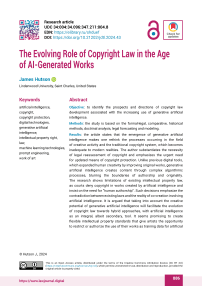The Evolving Role of Copyright Law in the Age of AI-Generated Works
Автор: Hutson J.
Журнал: Journal of Digital Technologies and Law @lawjournal-digital
Статья в выпуске: 2 (4), 2024 года.
Бесплатный доступ
Objective: to identify the prospects and directions of copyright law development associated with the increasing use of generative artificial intelligence. Methods: the study is based on the formal-legal, comparative, historical methods, doctrinal analysis, legal forecasting and modeling. Results: the article states that the emergence of generative artificial intelligence makes one rethink the processes occurring in the field of creative activity and the traditional copyright system, which becomes inadequate to modern realities. The author substantiates the necessity of legal reassessment of copyright and emphasizes the urgent need for updated means of copyright protection. Unlike previous digital tools, which expanded human creativity by improving original works, generative artificial intelligence creates content through complex algorithmic processes, blurring the boundaries of authorship and originality. The research shows limitations of existing intellectual property law, as courts deny copyright in works created by artificial intelligence and insist on the need for “human authorship”. Such decisions emphasize the contradiction between existing laws and the reality of co-creation involving artificial intelligence. It is argued that taking into account the creative potential of generative artificial intelligence will facilitate the evolution of copyright law towards hybrid approaches, with artificial intelligence as an integral, albeit secondary, tool. It seems promising to create flexible intellectual property standards that give artists the opportunity to restrict or authorize the use of their works as training data for artificial intelligence, as well as ensure that authors retain control over their works included in datasets for training artificial intelligence, in case copyright metadata is integrated into digital works, etc. Scientific novelty: based on the analysis of the latest judicial precedents, modern international regulations and evolving institutional practices, the author proposes a balanced adaptive approach to copyright reform to ensure the ethical integration of generative artificial intelligence into the creative ecosystem and to develop flexible copyright protection measures that correspond to the rapid technological progress. Practical significance: the proposed combined approach will allow generative AI tools to become part of the human creative process in the same way that previous generations used digital tools. At the same time, it will contribute to the creation of an environment where the autonomy of authors is respected. This will not only protect the creators of creative content, but also broaden the understanding of creativity as a collaboration with generative artificial intelligence, where artificial intelligence is positioned as a force that complements but not replaces humans in creativity.
Artificial intelligence, copyright, copyright protection, digital technologies, generative artificial intelligence, intellectual property right, law, machine learning technologies, prompt engineering, work of art
Короткий адрес: https://sciup.org/14131256
IDR: 14131256 | УДК: 34:004:34.096:347.211:004.8 | DOI: 10.21202/jdtl.2024.43


